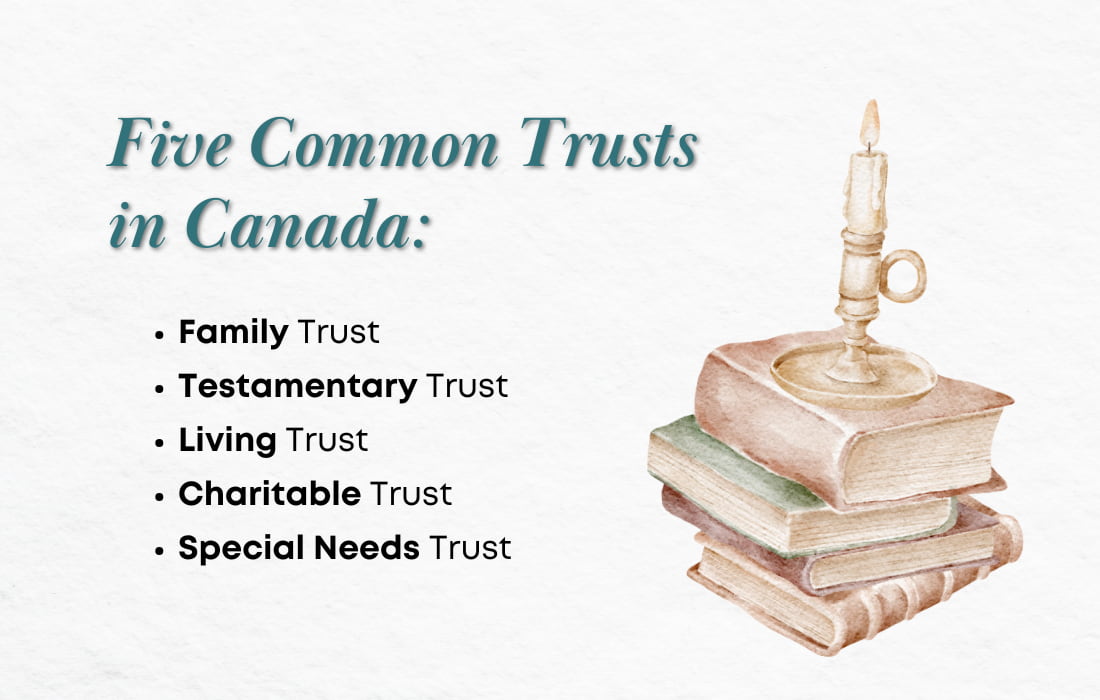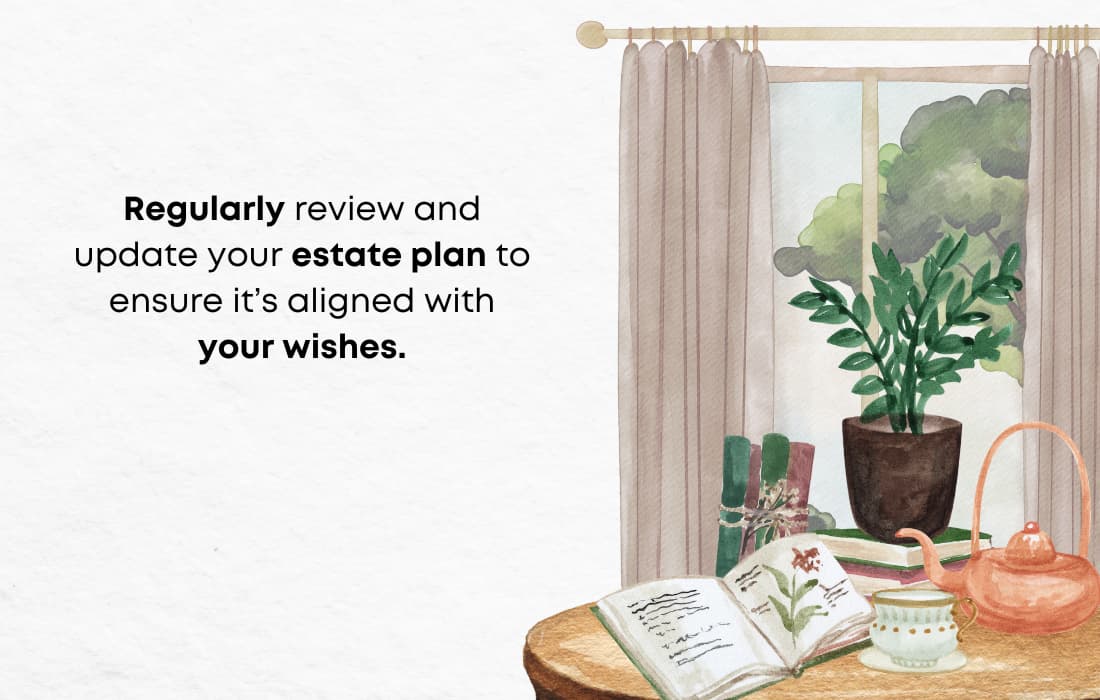Is It Time to Get Your Estate in Order?
If you’re searching for guidance on will and estate planning in Canada, you’re likely looking to ensure your assets are passed on to your loved ones in a way that is logical and thoughtful.
Whether you’re creating a will or wondering if you need to set up a trust, I’m going to give you a brief overview of the will and estate planning landscape in Canada.
Written By Tiffany Woodfield, Financial Coach, TEP®, CRPC®, CIM®

Table of Contents
- Estate Planning Myths
- Understand Will and Estate Planning in Canada
- Set Key Estate Planning Objectives
- Consider Establishing a Trust for Your Canadian Estate
- Provide for Dependents in Your Estate Plan
- Consider Power of Attorney in Your Estate Plan
- Plan for Executor Responsibilities in Your Canadian Estate
- Maximize Your Estate for Your Family’s Benefit
- Ensure Liquidity to Settle Your Estate
- Incorporate Philanthropy in Your Estate Plan
- Consider Potential Incapacity with Essential Documents
- Navigate Probate and Privacy in Canadian Estates
- Factor in Joint Ownership in Your Estate Plan
- Plan for Business Continuity in Your Estate
- Protect Your Estate from Legal Challenges
- Consider How the Size of Your Estate Affects Your Plan
- Create an Estate Planning Checklist
- Incorporate Tax Planning in Your Estate Plan
- Common Questions
Estate Planning Myths
Over the years, I’ve spoken to countless friends and clients who believe they don’t need to think about estate planning just yet—they say they’ll get to it once they achieve a certain level of wealth or reach a milestone age.
I wonder if they realize how vulnerable they are by delaying these important decisions.
I get it, because the truth is, nobody wants to think about what could happen if they were incapacitated or passed away, so it is easier to keep putting it off. But by dedicating even a small amount of time to create an estate plan (such as drafting a will with a lawyer) they can save their loved ones from headaches and emotional turmoil down the road.
I like to compare it to writing a love letter—by sharing your wishes, you provide a sense of security for those you care about most.
It’s essential to take a moment to plan ahead; doing so ensures that your loved ones can focus on remembering you, rather than worrying about financial matters.

17 Will & Estate Planning Tips for Canadians
1. Understand Will and Estate Planning in Canada
Will and estate planning is the process of deciding what will happen to your things after you pass away.
It involves creating a legal document called a will, where you can say who gets your belongings, like your house or favorite things.
Estate planning is broader and more comprehensive. It includes thinking about important decisions, like who will care for your pets or children if something happens to you. It also includes healthcare decisions should you become incapacitated.
The reason you do estate planning is to make things easier for your family and to ensure your wishes are followed.
2. Set Key Estate Planning Objectives
You want to think about your most important estate planning goals.
Some common examples are:
- Ensure your belongings go to the people you want when you pass away.
- Setting things up to reduce any confusion or disagreements later on.
- Choosing someone you trust to handle your financial affairs.
- Name an individual(s) to care for your children or pets, if needed.
- Planning for taxes or costs so your loved ones receive as much as possible.
3. Consider Establishing a Trust for Your Canadian Estate
Establishing a trust for your estate provides greater flexibility and control over managing and distributing your assets than a will. Get proper advice to ensure the trust is logical based on your circumstances.
Here are five common trusts in Canada, and when you may use them:
- Family Trust: This is set up to hold family members’ assets, and is often used to protect assets from creditors, to reduce taxes, to avoid probate, and to pass along assets to minor children.
- Testamentary Trust: A testamentary trust is created in your will and comes into effect after you pass away. It is helpful to manage assets for specific beneficiaries, like children, until they reach a certain age.
- Living Trust: This operates while you are still alive and allows you to transfer assets to the trust, making it easier to manage your belongings and avoid probate when you pass.
- Charitable Trust: This is designed to benefit a charity, allowing you to donate assets while still having some control over them during your lifetime. It creates a tax planning opportunity.
- Special Needs Trust/ Qualified Disability Trust: This helps provide for a person with disabilities without affecting their eligibility for government benefits.

4. Provide for Dependents in Your Estate Plan
To provide for your dependents in your estate plan, be sure to involve a lawyer who understands the rules in your province. This reduces the risk of your will being overturned and your wishes not being followed.
The lawyer will also provide guidance on the steps and options to protect your dependents, such as:
- Naming your dependents as beneficiaries
- Considering a trust to manage money or assets for them until they are old enough to handle them responsibly
- Choosing a guardian in your will if you have minor children
5. Consider Power of Attorney in Your Estate Plan
A Power of Attorney (POA) is important in Canada because it allows you to choose someone you trust to make decisions for you if you can’t do it yourself.
This could happen if you become sick or injured and are unable to communicate your wishes. A POA helps ensure that your personal, medical, and financial matters are handled according to your wishes.
6. Plan for Executor Responsibilities in Your Canadian Estate
When planning for executor responsibilities, the most important thing is understanding the impact of who you choose as an executor.
Unfortunately, people think the role of an executor is an honour and underestimate the responsibility and time commitment it takes. Or they name multiple executors, which often leads to disagreements, delays, and increased costs because the executors must act together.
To avoid this, choose an executor carefully and discuss it with them in advance so they are prepared and know their responsibilities. And be open to considering using a third party, such as a trust company.
7. Maximize Your Estate for Your Family’s Benefit
The most important step to reduce estate settlement costs and maximize the inheritance for your family is to be proactive and start planning now.
Create a clear and organized will with the help of an estate lawyer. Consider using joint ownership for some of your assets, like bank accounts or property, so they can automatically pass to your loved ones without going through probate. Explore if setting up a trust is beneficial in your situation.
Finally, regularly reviewing and updating your estate plan can ensure that everything is up to date and aligned with your wishes.

8. Ensure Liquidity to Settle Your Estate
Planning for sufficient liquidity means ensuring you have enough cash or easy-to-access funds to cover important costs, like debts, taxes, and final expenses after you pass away.
This way, your family won’t have to sell valuable items, like your home or favorite belongings, just to pay those bills. You can achieve this by keeping some money in savings accounts or setting up life insurance that provides cash when needed.
9. Incorporate Philanthropy in Your Estate Plan
Including charitable giving as part of what you want to happen with your assets helps others and allows your memory to live on.
You can leave some of your money or valuable items to a charity or cause you care about, like animal shelters or education programs.
10. Consider Potential Incapacity with Essential Documents
It’s crucial to create essential documents that say who will make decisions for you if you can’t.
One key document is a Power of Attorney, which allows someone you trust to handle your financial decisions when you cannot do so. Another important document is an Advance Health Care Directive or Living Will, which explains your wishes for medical treatment if you become ill.
With these documents in place, you can ensure your choices are respected.

11. Navigate Probate and Privacy in Canadian Estates
The probate process is the legal way to prove that a person’s will is valid and grants the executor authority to administer the estate.
The probate process is generally a matter of public record. To maintain privacy, you can consider using a trust, which does not have to go through probate, keeping your wishes and assets more confidential.
12. Factor in Joint Ownership in Your Estate Plan
You will want to consider joint ownership when creating your estate plan, but before you jump to add someone to your assets, it’s important to understand the implications this can have.
For example, adding a child’s name to your home as a 50% joint owner may result in a taxable event because you are essentially “selling” half of the value of your home.
This also means your child would legally own 50% of the house, which could lead to complications in the future when you want to make decisions about it. However, jointly owning the home with your spouse typically makes sense. Therefore, it’s crucial to fully understand joint ownership’s tax and legal implications before making any decisions.
13. Plan for Business Continuity in Your Estate
When doing estate planning, you want to plan for business continuity if something happens to you.
To do this, consider bringing in key individuals who could run the business while you are still around. Provide information on the systems and how your business operates.
Consider insurance to provide liquidity so you aren’t forced to sell important assets. A trust can be helpful, especially with family members who are involved in the business and others who aren’t.
14. Protect Your Estate from Legal Challenges
Consulting with a legal professional specializing in estate planning can help ensure your documents are correctly prepared and minimize the risk of challenges.
You also want to regularly update your estate plan to reflect any life changes, like marriage or the birth of children. To prevent disputes, discussing your plan with your family helps ensure they understand your decisions and their reasons.
15. Consider How the Size of Your Estate Affects Your Plan
The size of your estate can significantly impact your estate plan because larger estates may face more complex tax implications and legal considerations.
For example, if you have substantial assets, you might need to create trusts to help minimize taxes and protect your wealth for future generations. A larger estate may also require more detailed instructions in your will to ensure that all your belongings are distributed according to your wishes.
And remember, just because your estate isn’t “large,” you still benefit from doing estate planning.

16. Use an Estate Planning Checklist
Here’s a simple estate planning checklist to help you get started:
1. Write a Will: Clearly outline how you want your assets to be distributed and choose an executor to manage your estate.
2. Establish Powers of Attorney: Assign trusted individuals to make financial and healthcare decisions on your behalf if you cannot do so.
3. Consider Trusts: Explore setting up trusts to manage assets, minimize taxes, or provide for specific beneficiaries, especially if you have minor children.
4. Review Beneficiary Designations: Check your insurance policies and retirement accounts to ensure beneficiaries are up to date and match your wishes.
17. Incorporate Tax Planning in Your Estate Plan
Incorporating tax planning into your estate plan is important to minimize the tax burden on your heirs.
Start by understanding the taxes that may apply to your estate, such as estate taxes, income taxes on capital gains, and probate fees. You can also consider strategies like gifting assets to your loved ones while you’re alive, but beware, this may create an immediate taxable event.
Additionally, establishing trusts can help protect your wealth and provide tax advantages, ensuring that more of your assets go to your beneficiaries rather than taxes.

Common Questions
At what level of wealth do you need to do estate planning?
Estate planning is essential for everyone, regardless of their wealth level, but it becomes particularly crucial as your assets grow or at certain life stages.
Generally, if you own significant assets, have dependents, or have been married or divorced, it’s a good idea to start planning your estate.
Do I need to include business assets in my estate plan?
Yes, it’s important to include business assets in your estate plan, as they can represent a significant portion of your overall wealth.
Appropriately handling these assets ensures that your business can continue to operate smoothly and that your wishes regarding its management and distribution are clearly communicated.
What is an estate trustee?
An estate trustee is a person chosen to manage and oversee the estate of someone who has passed away. Their job is to follow the instructions in the will and make sure everything is done correctly.
What is included in a comprehensive estate plan?
A comprehensive estate plan includes important documents like a will, a Power of Attorney, and an Advance Care Directive. It may also include trusts to help manage your assets and plans for taking care of dependents.
Is a DIY will a legal document?
Yes, a DIY (do-it-yourself) will can be a legal document if it is properly prepared and meets the legal requirements in your province or territory. However, it’s important that it follows the specific laws, as mistakes could lead to invalidating the will.

Which other estate planning documents do I need besides a will?
Besides a will, you also need a Power of Attorney, a Living Will (or Health Care Directive), and guardianship documents. You may need trust documents if you are considering a trust.
What is the most important step in getting my financial affairs in order?
The most important step is to appreciate the consequences of not having an estate plan, so you take action right away.
What are estate plans?
Estate plans are legal and financial strategies that ensure your assets are distributed according to your wishes after your passing. They include wills, trusts, power of attorney, and tax planning.
For cross-border individuals, estate planning must consider differing U.S. and Canadian tax laws to avoid unintended consequences.
Do I need my own will, or can I have a will with a spouse?
Each spouse should have a will, especially in cross-border situations. Laws differ between Canada and the U.S., and separate wills help address jurisdictional complexities.
Joint wills can create complications, limiting flexibility if circumstances change. A tailored approach ensures your estate plan aligns with your specific wishes and tax considerations.
How can I ensure that my final wishes are respected and followed?
To ensure your final wishes are respected, create a legally sound estate plan with a will, power of attorney, and possibly a trust.
Work with a cross-border estate planning lawyer to navigate U.S. and Canadian laws. Choose a reliable executor and clearly document your intentions to avoid disputes.
What should I do if I don’t have a family member to whom I can give my assets?
If you have no family beneficiaries, consider leaving assets to a trusted friend, charity, or establishing a foundation. A professional trustee or corporate executor can manage your estate.
Work with a cross-border advisor to structure your plan efficiently, ensuring tax advantages while honoring your philanthropic or personal legacy goals.in aliquet metus vitae dolor eleifend facilisis. Nullam placerat tincidunt velit ut aliquam.
Get the Free Guide and Audio Meditation for Manifesting Your Dreams
Pop your email address in the form below to get my easy checklist and guide to manifesting and the guided audio meditation to help you get started.
You’ll also get one or two emails per month with the latest blog posts about abundance, wealth-building, manifesting, and creating a fulfilling life.
Read More:
💎 Simple Estate Planning Checklist for Canadians
💎 Why Estate Planning Isn’t Just for the Ultra-Wealthy
💎 At What Age Should I Consider Estate Planning?
About the Author

TIFFANY WOODFIELD is a financial coach, cross-border expert, and the co-founder of SWAN Wealth based out of Kelowna, BC. As a TEP and associate portfolio manager, Tiffany has extensive experience working with successful professionals who want to leave a legacy and enjoy an adventurous, work-optional lifestyle. Tiffany combines extensive knowledge from her background as a financial professional with coaching and her passion for personal development to help her clients create a unique path that allows them to live their fullest potential. Tiffany has been a regular contributor to Bloomberg TV and has been interviewed by national and international publications, including the Globe and Mail and Barron’s.